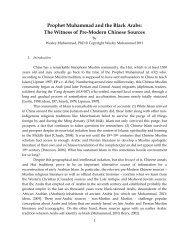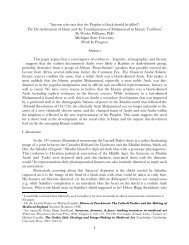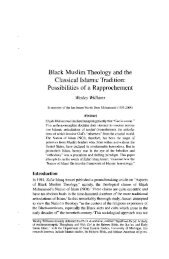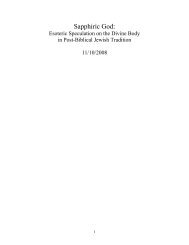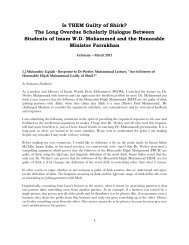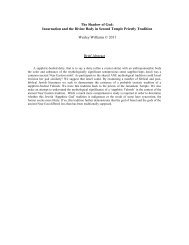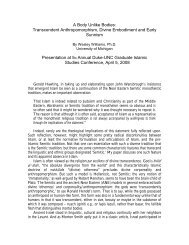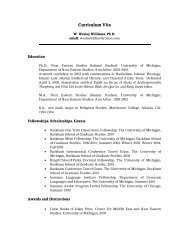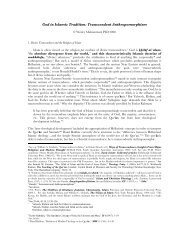Is THEM Guilty of Shirk? - Dr. Wesley Muhammad
Is THEM Guilty of Shirk? - Dr. Wesley Muhammad
Is THEM Guilty of Shirk? - Dr. Wesley Muhammad
Create successful ePaper yourself
Turn your PDF publications into a flip-book with our unique Google optimized e-Paper software.
He adds to his case by saying that the Qur'an's use <strong>of</strong> the word laysa, which means 'not' indicates that the<br />
negation is not necessarily absolute. He argues that if Allah wanted to make it perfectly clear that there is<br />
absolutely nothing like Allah, He would have used the emphatic negation Laa rather than laysa. So, to <strong>Dr</strong>.<br />
<strong>Wesley</strong>, the use <strong>of</strong> laysa means that there is some room for interpreting this phrase differently. He<br />
references the verse which says about the prophet's wives that they are not like any <strong>of</strong> the other women.<br />
The word laysa is used here and he retorts, "does this mean that the prophet's wives are not women?"<br />
Therefore, he reasons, when Laysa is used in 42:11 it does not necessarily mean that Allah is not like a<br />
man.<br />
RESPONSE 4<br />
<strong>Dr</strong>. <strong>Wesley</strong>'s complaint here is with the translation <strong>of</strong> ayat 11. We have to ascertain whether his<br />
translation <strong>of</strong> this verse is more accurate than the translations <strong>of</strong> over 30 translators. Go to this website<br />
http://www.islamawakened.com/Quran/42/11/default.htm to see thirty different translations <strong>of</strong> this<br />
verse. None <strong>of</strong> them translate it the way <strong>Dr</strong>. <strong>Wesley</strong> does. Let me explain why.<br />
<strong>Dr</strong>. <strong>Wesley</strong> correctly points out that 'Ka' is a particle <strong>of</strong> comparison in this phrase. So, Laysa Ka can be<br />
translated "there is not Like" or it could be translated "there is not a comparison" or "there is not a<br />
similar." The word Mathli comes from Mathalun, which means resemblance, likeness, similar.<br />
So Laysa Ka-Mithli simply means "There is not like (ka) his resemblance (Mithli)" or "There is not a<br />
comparison (ka) <strong>of</strong> His resemblance (Mithli)" or as <strong>Dr</strong>. <strong>Wesley</strong> has said, "There is not like (ka) his likeness<br />
(mithli), meaning there is no thing like or that can be compared to Allah. This is why the translators<br />
translate, "There is nothing like Him or that can be compared to Him."<br />
However, <strong>Dr</strong>. <strong>Wesley</strong> says that is exactly the point. That by saying nothing can be compare to Allah's<br />
likeness, tells us that Allah has a likeness, which is that He is like Himself, like His own image. To this we<br />
must reply....duh! That is the whole point. Allah is One, Unique, Like Himself Only, not like anything in<br />
His creation, not like the sun, moon, stars or a man. This is what Abraham discovered; that Allah is not<br />
like the stars, moon, or sun, and by extension, not comparable to a man either. Allah is like His own<br />
likeness (or image if you want) and we men and women can't see or comprehend Him, His likeness, or His<br />
image.<br />
The second part <strong>of</strong> <strong>Dr</strong>. <strong>Wesley</strong>'s argument is that the use <strong>of</strong> the verb Laysa rather than Laa is evidence<br />
that Allah did not really mean that there is nothing like Himself, because if He did mean that He would<br />
have used the particle Laa which is sometimes used to emphatically negate something beyond a shadow <strong>of</strong><br />
a doubt and into future. <strong>Dr</strong>. <strong>Wesley</strong> questions why Laa was not used?<br />
On the contrary, the emphatic Laa is used in many places in the Qur'an to make it clear that Allah is not<br />
a man or anything else in creation that a man would want to worship as G-d. In Sura 2:163 the emphatic<br />
Laa is used to say that Allah is One; not 2 or 3. In Sura 2:255 the emphatic Laa is used to establish that<br />
there is no Allah but Himself, the Ever-Living (Al-Hayyu), the Eternal (Al-Qayyuumu).<br />
It is worth noting, that no man has always lived and will continue to live forever. If you say a man can,<br />
then you have changed the definition <strong>of</strong> a man. Why make a man into G-d, so you can worship a man?<br />
Why not just worship G-d? Secondly, while the meaning <strong>of</strong> the word Samad in Suratul Ikhlas is<br />
sometimes translated as Eternal (no beginning and no ending), it is more accurately translated as He is<br />
Independent, on whom all other things depend. But, the word used in 2:255 is Al-Qayyuum, which does<br />
mean Eternal. This same verse states that Allah does not sleep. Men sleep. The verse also says that no one<br />
9



